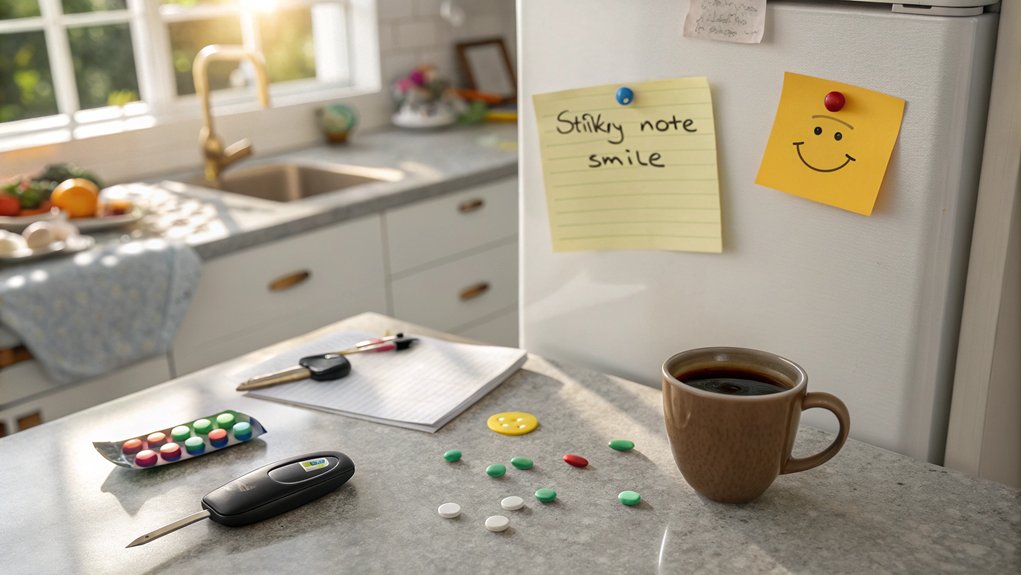Temporary Memory Loss Triggers And Simple Solutions

Prefer listening? Check out the podcast version of this article.
Consider your mind as a finely tuned instrument, susceptible to the slightest discord, like stress, inadequate sleep, and medication side effects.
These elements can trigger temporary memory loss, disrupting your mental harmony.
By establishing routines, practicing mindfulness, and incorporating physical activity, you can enhance cognitive resilience.

Memory aids and organized environments also bolster retention.
Explore these techniques further to regain control over your memory’s melody.
Table of Contents
Common Memory Disruptors
You’re likely aware that various factors can disrupt memory function, including brain and body health issues, daily habits, and prescription side effects.
Neurological conditions like strokes or brain injuries can impair memory processing, while lifestyle choices such as sleep deprivation and substance use can hinder memory consolidation.
Additionally, certain medications, including antidepressants and antihistamines, have been shown to affect cognitive function, emphasizing the need for a comprehensive understanding of these common disruptors.
Brain and Body Health Issues
When it comes to brain and body health issues that disrupt memory, multiple factors need to be considered due to their complex interactions with cognitive processes.
You need to focus on cognitive decline prevention by embracing neurological wellness strategies.

Aging brain health can be bolstered through memory enhancement techniques, such as mental resilience training.
It’s crucial to conduct a lifestyle influence assessment to identify detrimental habits impacting memory.
Addressing these areas can significantly improve cognitive function.
Discover Your Path to a Longer, Healthier Life!
Take our free quiz to see how your lifestyle measures up to the world's longest-living communities and receive expert tips for a healthier, longer life.
Take the QuizTechniques like brain exercises not only enhance memory but also support overall neurological health.
By fostering a proactive approach to brain care, you can mitigate memory disruptions.
Stay informed about the latest research to effectively manage and improve your cognitive abilities over time.
Daily Habits Impact
Although often overlooked, daily habits play a significant role in influencing memory function.
Your daily routines, including both lifestyle choices and cognitive engagement, can substantially impact memory retention.
For instance, emotional wellbeing is crucial; stress and anxiety can disrupt neural pathways essential for memory processing.
Engaging in mindfulness practices can mitigate these effects, promoting better cognitive function.
Moreover, environmental factors such as noise pollution and inadequate lighting can compromise your ability to concentrate and recall information.
Prioritizing consistent sleep schedules and balanced nutrition further supports brain health.
Prescription Side Effects
Prescription medications, while essential for treating various health conditions, can inadvertently disrupt memory function, leading to temporary memory loss.
Cognitive side effects often arise from prescription interactions and improper medication management.
It’s crucial to monitor how different drugs interact, as these can exacerbate memory disruption.
Dosage adjustments may be necessary to mitigate these effects, ensuring that you’re receiving the optimal therapeutic benefit without compromising cognitive function.
Additionally, withdrawal symptoms from abruptly stopping medications can further impair memory.
Understanding the long-term implications of your medication regimen is vital.
Regular consultations with healthcare providers can help manage these risks, tailoring treatment plans to minimize memory loss while addressing the underlying health issues effectively.
Always prioritize open communication about any cognitive changes you experience.
Immediate Action Steps
To address temporary memory loss immediately, focus on enhancing sleep quality, integrating physical movement routines, and employing effective stress management techniques.
Prioritizing sleep is critical; studies show that poor sleep disrupts memory consolidation processes in the hippocampus.
Incorporating regular exercise and stress-reduction practices, such as mindfulness-based interventions, can significantly improve cognitive function and memory retention.
Sleep Quality Enhancement
When aiming to enhance sleep quality for better memory retention, understanding the intricate connection between sleep and cognitive function is crucial.
Implementing sleep hygiene practices, such as consistent sleep schedules and bedtime relaxation techniques, can optimize your sleep environment and align your circadian rhythm.
Consider the benefits of napping and employ sleep tracking tools to monitor patterns and identify areas for improvement.
| Strategy | Benefit |
|---|---|
| Sleep Hygiene Practices | Improves overall sleep quality |
| Bedtime Relaxation Techniques | Reduces stress, promotes relaxation |
| Sleep Tracking Tools | Provides insights into sleep patterns |
Enhancing your sleep environment by minimizing light and noise also supports uninterrupted rest.
Consistent routines reinforce circadian rhythm alignment, further aiding memory consolidation.
These strategic steps can significantly impact cognitive enhancement and memory retention, offering an empirical approach to mitigating temporary memory loss triggers.
Physical Movement Routines
Engaging in regular physical movement routines provides a multitude of cognitive benefits, with evidence showing that exercise significantly enhances memory retention and cognitive processing.
The exercise memory link is well-documented, revealing that physical activity benefits extend beyond general health to include improved brain function.
Incorporating movement therapy techniques, such as balance improvement strategies and flexibility training effects, can augment cognitive resilience.
Aerobic workouts impact the hippocampus, a crucial brain region for memory, by promoting neurogenesis and enhancing synaptic plasticity.
Additionally, integrating diverse physical exercises into your routine ensures a comprehensive approach to cognitive health.
Stress Management Techniques
Although stress is an inevitable part of modern life, understanding and implementing effective stress management techniques can significantly mitigate its impact on memory function.
Mindfulness practices, such as meditation and guided imagery, enhance cognitive abilities by promoting focus and awareness.
Deep breathing exercises, a simple yet powerful relaxation technique, reduce cortisol levels, improving memory retention.
Practicing time management helps decrease stress by organizing tasks efficiently, allowing you to prioritize and allocate time for leisure.
Journaling offers cognitive benefits by providing an outlet to process emotions and track stressors, ultimately leading to improved memory function.

Incorporating these strategies into daily routines fosters resilience against stress-induced memory loss, supporting overall cognitive health and well-being through evidence-based practices.
Brain Boosting Strategies
To enhance cognitive function and mitigate temporary memory loss, you should focus on brain boosting strategies that encompass mental exercise activities, social connection building, and nutrition plus supplements.
Engaging in activities like puzzles and learning new skills activates neuroplasticity, fostering improved memory retention.
Additionally, maintaining social connections has been shown to reduce stress and support cognitive health, while a balanced diet with essential nutrients and specific supplements like omega-3 fatty acids can further bolster brain performance.
Mental Exercise Activities
While enhancing cognitive resilience, mental exercise activities are crucial for boosting brain health and mitigating temporary memory loss.
Engaging in targeted tasks can improve mental agility and focus.
Consider these strategies:
- Memory Games and Brain Puzzles: These stimulate neural pathways, enhancing synaptic plasticity and improving recall capabilities.
- Learning Techniques: Adopting methods like spaced repetition or mnemonic devices facilitates knowledge retention, crucial for strengthening memory integrity.
- Creative Thinking and Focus Exercises: Activities that challenge you to think outside the box foster innovation and problem-solving skills, promoting cognitive flexibility.
Social Connection Building
Building on the benefits of mental exercise activities, fostering social connections offers a powerful strategy to enhance cognitive function and mitigate temporary memory loss.
Engaging in social support networks provides emotional stability and cognitive stimulation, which are crucial for maintaining mental health.
Community engagement opportunities, such as clubs or local events, encourage social interaction strategies that keep your mind active.
Participating in relationship strengthening activities helps improve communication skills, vital for memory retention.
Group learning experiences, such as study groups or discussion forums, promote collaborative problem-solving, further boosting cognitive resilience.
Volunteer involvement benefits your brain by providing a sense of purpose and increasing neural activity.
These social interactions create a stimulating environment that supports memory and cognitive health, reducing the risk of memory impairment.
Nutrition and Supplements
Proper nutrition is a cornerstone of cognitive health, directly influencing memory and brain function.

The timing of your meals can affect vitamin absorption and hydration levels, ensuring vital nutrients reach your brain when needed.
Consider focusing on:
- Dietary Fats: Omega-3 fatty acids, found in fish and flaxseed, support neural plasticity and memory retention.
- Antioxidant Sources: Berries and leafy greens provide antioxidants that combat oxidative stress, preserving cognitive function.
- Supplement Types: Consider supplements like B-vitamins and vitamin D if dietary intake falls short, but consult a healthcare provider for personalized advice.
Balancing these elements can mitigate temporary memory loss by enhancing brain performance.
Expert Help and Tools
You can significantly enhance memory retention by incorporating memory aid technology and optimizing your living space organization.
Research indicates that using digital tools such as reminder apps and electronic calendars can improve daily task management and reduce cognitive load.
Lifespan Comparison Tool
Compare the life expectancy by the U.S. State
Additionally, creating a well-organized living environment with clearly labeled areas and consistent placement of essential items can facilitate better memory recall and cognitive efficiency.
Memory Aid Technology
While technology advances, memory aid tools have become increasingly sophisticated and accessible, offering expert assistance to individuals dealing with temporary memory loss.
You can leverage these tools to enhance cognitive function and retain information more effectively.
Consider the following technological solutions:
- Memory Aid Apps: These apps provide digital reminders and cognitive training exercises to help you stay organized and mentally sharp. They often integrate with your smartphone for seamless use.
- Wearable Devices: Devices like smartwatches offer continuous virtual support and memory prompts, ensuring you never miss important tasks or events.
- Memory Games: Engaging in scientifically-designed memory games can improve cognitive function. These games are available on multiple platforms, offering flexibility and accessibility.
Living Space Organization
Building on the benefits of memory aid technology, organizing your living space can significantly enhance cognitive function and aid memory retention.
Living space decluttering reduces cognitive overload, allowing you to focus and retrieve information efficiently.
Utilize organizational tools such as labeled storage bins and color-coded files to create memory-friendly layouts that promote systematic order.
Incorporate visual cues like strategically placed sticky notes or calendars to reinforce memory recall.
Establish distraction-free zones by eliminating unnecessary items, which minimizes sensory input and helps maintain focus.
Routine maintenance, such as weekly tidying, reinforces these systems, ensuring they remain effective.
This structured environment not only supports memory retention but also fosters a sense of calm, reducing stress-related triggers of temporary memory loss.
Conclusion
In a nutshell, tackling temporary memory loss involves addressing common disruptors like stress and sleep deprivation.
Start by setting a consistent sleep schedule and practicing mindfulness to keep stress at bay.
Regular physical activity also plays a key role in boosting cognitive function.
Don’t overlook the power of digital reminders and an organized living space to enhance memory retention.
If you hit a wall, seeking expert advice and tools can make all the difference in overcoming these challenges.

 972-393-1699
972-393-1699





